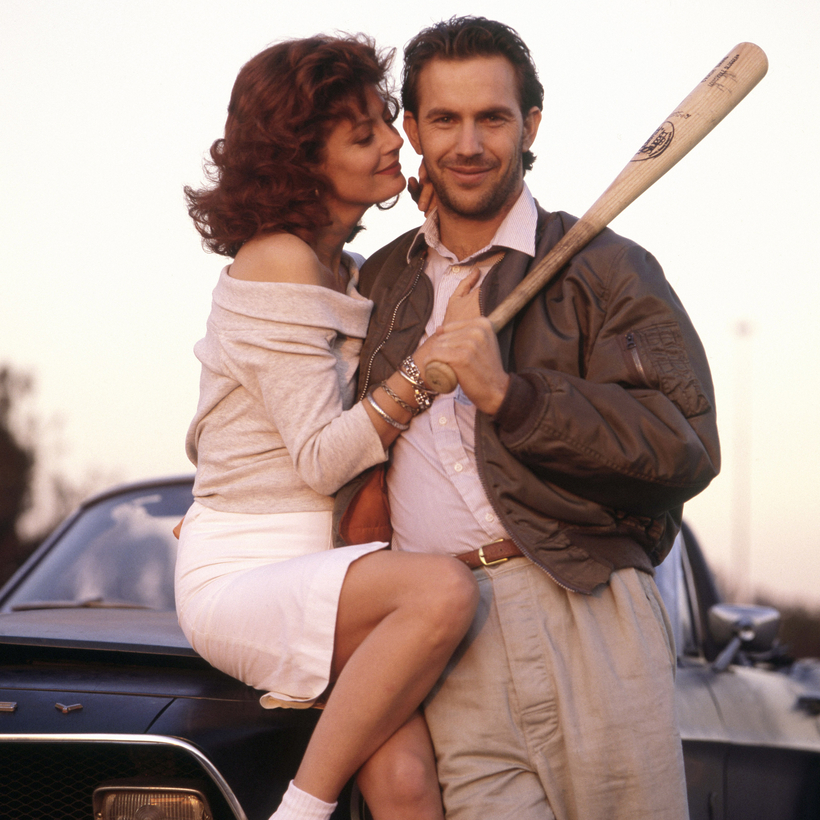Ron Shelton hears America singing, schmoozing, and swearing. His writing-directing debut, Bull Durham (1988), transported fans into the offbeat mystique and comic muck of baseball. As Shelton’s spellbinding heroine Annie Savoy, played by Susan Sarandon, reminds us, Walt Whitman called the sport “our game … America’s game.” Shelton’s new memoir, The Church of Baseball, does for filmmaking what Bull Durham did for the national pastime: it demystifies the craft, pillories the business, and celebrates the calling with wit and passion.
Shelton’s prose is as natural as his dialogue, and he conjures characters with casual mastery: Kevin Costner’s gung-ho professionalism (he insisted on auditioning as an athlete), Tim Robbins’s freshness and immediacy (“his boyish face, his physicality, an impish grin”), and Sarandon’s sui generis razzle-dazzle (“Susan flashed into the room looking brilliant,” wearing “a tube dress with four-inch red and white horizontal stripes that announced her presence with authority”).
We instantly see how these characters fit into the giddy comedy of Bull Durham: Costner as seasoned catcher and crack baseball mind Crash Davis; Robbins as his designated mentee, Ebby Calvin “Nuke” LaLoosh, a rookie pitcher for the Durham (N.C.) Bulls with a “million-dollar arm and a five-cent head”; Sarandon as the would-be phenom’s sexy guru, a part-time junior-college English teacher and ardent student of the game who devotes herself to the holistic instruction of one hot prospect per year.
They form an oddball triangle in a backwater subculture that’s a little bit country and a lot rock ‘n’ roll—and, thanks to Annie, a little Edith Piaf too.
Shelton, 76, connects their story to his own five years in the minor leagues, playing mostly second base and shortstop for the Baltimore Orioles’ farm teams. How much does Crash resemble Shelton? Well, Crash was “different” because he read “a book without pictures once.” Shelton devoured novels, from Kiss Me Deadly to The Magic Mountain, hiding them inside skin magazines so he’d come off as “one of the guys.”
Unlike Crash, Shelton didn’t set a record for home runs, but he did once lead the California League in doubles. He recalls hard-luck players belting out, à la Engelbert Humperdinck, “Please release me, let me go, for I don’t love you anymore.” Shelton explains, “They couldn’t sing the truth”—that “baseball” or “the organization … had stopped loving them.” This unrequited love gives Bull Durham its sweet-and-sour tang.

Shelton writes warmly about his peripatetic film school: the neighborhood cinema in each small city he rolled into. As he watched Peckinpah’s The Wild Bunch in Little Rock, the depth and mystery of its greatness ignited his moviemaking dreams. Eighteen years and two terrific scripts later (1983’s Under Fire and 1986’s The Best of Times, both flops), he knew that the only way to leap into directing was to base a script on a life he knew better than anyone else in Hollywood.
Shelton quotes E. L. Doctorow: “Writing is like driving at night in the fog. You can only see as far as your headlights, but you can make the whole trip that way.” The book takes us inside his screenwriting process as his characters emerge with distinct voices and signature first lines, such as brash, puppyish Ebby, soon to be “Nuke”: “Hey, Skip, you think I need a nickname?” Wily, sardonic Crash: “I am ‘the player to be named later.’” And, of course, down-home, exotic Annie: “I believe in the Church of Baseball.” She lists her past deities, from Buddha to Isadora Duncan, and locks into focus as a perennial 60s-quester.
As Shelton tells it, production on Bull Durham started as a steeplechase and became a minefield. Orion struck a last-minute deal for it on opening day of the studio’s surprise hit No Way Out, starring Costner. But Shelton still had to fight “the suits” and others to defend his inexplicably controversial cast. When one producer insinuated to Sarandon that she looked bad in a close-up, Shelton, to his embarrassment, went “berserk,” manhandling the meddler in front of cast and crew. Robbins and Costner fondly dubbed him “Cujo.”
When Shelton’s cinematographer devised a super-efficient lighting rig, it alarmed a studio observer for resembling (in Shelton’s words) “the raft of Thor Heyerdahl’s Kon-Tiki.” He became a “blood sacrifice” so Shelton could save Robbins, whose sly, original performance befuddled the higher-ups at Orion.
“A movie is like a hot-air balloon carrying a basket full of narrative information,” Shelton notes, “and it’s necessary to start throwing the cargo overboard until the balloon takes off.” In postproduction, he excised a speech that spelled out Annie’s raison d’être. We get to savour it here—one of the book’s many dynamite surprises. He fought, though, to save the uproarious pagan sermon on the mound where Crash addresses banal concerns (a team wedding gift, a visit from Nuke’s father) and baroque imperatives (breathing through eyelids, the need for a live rooster to take a curse off the first baseman’s glove).
In The Church of Baseball, as in Bull Durham, Shelton riffs on life in the American grain, and scales the heights of the homegrown surreal. Like Mark Twain, he reveals an unsentimental education that reads like a robust and impudent yarn.

Michael Sragow is the author of Victor Fleming: An American Movie Master and most recently co-wrote and co-produced the documentary Fiddler’s Journey to the Big Screen


